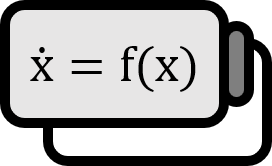Identification of Sinks and Sources in One-Dimensional Maps
Theorem1
Let’s say some $p \in \mathbb{R}$ is a fixed point for a smooth map $f : \mathbb{R} \to \mathbb{R}$.
- [1] If $| f ' (p) | < 1$, then $p$ is a sink.
- [2] If $| f ' (p) | > 1$, then $p$ is a source.
Example
As an example of a $1$-dimensional map, consider $f(x) = x^3$ which makes it easy to see that the fixed point $f(0) = 0$ is a sink, and $f(1) = 1$ is a source since $f ' (x) = 3x^{2}$.
Proof
Proof of Theorem [1]
Let’s assume $a \in \left( | f '(p) | , 1 \right)$.
$$ \lim_{x \to p} {{ | f(x) - f(p) | } \over { | x - p | }} = | f ' (p) | $$
Therefore, for all $x \in N_{\epsilon } ( p)$,
$$ {{ | f(x) - f(p) | } \over { | x - p | }} < a $$
There must exist $\epsilon > 0$ such that, meaning $| f(x) - p | < a | x - p |$ but since $a < 1$, it gets closer to $p$ every time $f$ is applied to $x$. In other words, for all $k \in \mathbb{N}$, $\left| f^{k} (x) - p \right| \le a^{k} | x - p |$, thus $p$ must be a sink.
■
Proof of Theorem [2]
Let’s assume $a \in \left( 1, | f '(p) | \right)$.
$$ \lim_{x \to p} {{ | f(x) - f(p) | } \over { | x - p | }} = | f ' (p) | $$
Therefore, for all $x \in N_{\epsilon } ( p)$,
$$ {{ | f(x) - f(p) | } \over { | x - p | }} > a $$
There must exist $\epsilon > 0$ such that, meaning $| f(x) - p | > a | x - p |$ but since $a > 1$, it gets further from $p$ every time $f$ is applied to $x$. In other words, for all $k \in \mathbb{N}$, $\left| f^{k} (x) - p \right| \ge a^{k} | x - p |$, thus $p$ must be a source.
■
Yorke. (1996). CHAOS: An Introduction to Dynamical Systems: p10. ↩︎
